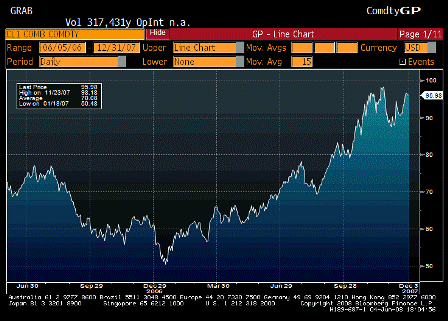The FOMC can’t possibly believe that a 2% Fed Funds rate is the ‘right’ rate given current CPI of about 4%, core at about 2.5%, GPD moving back up towards 2%, unemployment ‘only’ about 5%, and inflation expectations showing signs of elevating.
The 2% Fed Funds rate is only appropriate if their forecasts show as sufficiently high probability of economic deterioration and increased ‘slack’.
As Fisher and other have put it, they all believe low and stable inflation is a necessary condition for optimal growth and employment.
The Lehman issue will pass with a lot less drama than the Bear Stearns issue.
Q2 GDP forecasts are being revised up as most numbers are coming in better than expected.
Inflation continues to move higher.
The ‘Mike Masters sell-off’ in commodities will run its course, with commodities subject to competitive markets underperforming, and crude moving higher (when the smoke clears – they try not to make their position too obvious as with the Goldman sell off of August 2006) as Saudis continue as price setter.
2006 Crude Sell Off
I expect the sell off to be less than the approximate three month sell off from the Goldman index change in 2006.
Obama is looking strong, but it has been historically problematic to propose tax hikes and win the election.
News reports of Bernanke’s speech:
“Some indicators of longer-term inflation expectations have risen in recent months, which is a significant concern for the Federal Reserve,” Bernanke said in a speech to graduating students at Harvard University.
Yes. To the point. They are concerned their own actions might indicate a higher tolerance for inflation and thereby elevate inflation expectations.
“We will need to monitor that situation closely,” he said, but added there was little sign a “1970s-style wage-price spiral, in which wages and prices chased each other ever upward,” might be starting.
The 1970s were all about oil prices working through the cost side of the economy, just as they are today. And there are still many nations with weak domestic demand, weak currencies, and continuously high levels of inflation.
He said the impact of soaring oil prices has been “relatively muted” because the amount of energy used to produce a given amount of output — a gauge known as energy intensity — has fallen markedly since the 1970s.
This only extends the delay between food/energy prices and core CPI.
He also said policy-makers learned a lesson in the 1970s, in particular that they must keep long-term inflation expectations anchored to achieve low and stable inflation.
Yes, the FOMC and the mainstream truly believes this. In fact, it’s all they have regarding ‘inflation’ vs. relative value changes in their models.
“If people expect an increase in inflation to be temporary and do not build it into their long-term plans for setting wages and prices, then the inflation created by a shock to oil prices will tend to fade relatively quickly,” he said.
Again, they all do truly believe this. They see inflation as a ‘monetary phenomena’, where somehow ‘too much money chases too few goods’. That makes ‘inflation’ a demand-side issue. Price pressures on the supply-side are only ‘relative value stories’ until ‘inflation expectations’ shape ‘long-term plans for setting wages and prices’.
[top]

